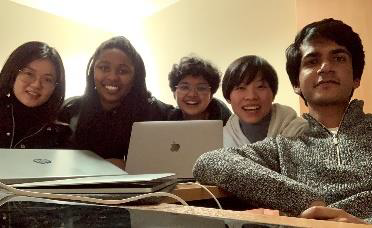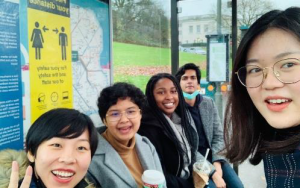
March 23, 2021, by aczjb1
Entrepreneurial Creativity: MSc Student Blogs
One of the most popular modules on the MSc Entrepreneurship, Innovation and Management at HGI is Entrepreneurial Creativity, run by Dr Chris Carter. The module is designed for budding entrepreneurs to understand, experience and explore the business planning process while learning how to use different theories and creative techniques to solve problems and generate new and innovative ideas. In the spirit of creativity, one of the assessment methods for the module is blog writing, and we asked a few of our current cohort to share their thoughts on what they learned about their own entrepreneurial creativity on the course.
Gabriella Kisoi
Over the course of the autumn semester, I have studied the ins and outs of Entrepreneurial Creativity (EC), exploring everything from the definition and importance of creativity, to ingenuity and systems theory, all the way to the psychology of creative behaviour. If asked to summarise my learning into a statement, it would be this: “Entrepreneurial creativity is boundless!”
I could simply describe this learning, but instead let me show you how it has illuminated my entrepreneurial journey.
Let me begin with the horror of week one when I discovered that a 40% chunk of my final grade would be dependent on creating a novel entrepreneurial idea on an undisclosed challenge with four strangers. Now, working in a group has never bothered me. In fact, just like 90% of new ventures, I started my own enterprise back home with a team – we all went to the same university, studied the same course, lived in the same town and originated from the same country.
Therefore, after working with people so similar to me for years, I was naturally concerned that the team on my module had nothing in common – even after discussing everything from jazz music to Thai boxing to Chinese food, and all the way to Olympic swimming.
Fast forward to week two of the module, we worked on a mini consulting activity known as “The Donut Challenge”. To our surprise, we discovered a shared love for donuts and branding after curating an app called “Tinder For Donuts”, a “Donate a Donut” CSR scheme and a “Donuts on Wheels” service.
Just like every other group, we were not immune to the personality clashes and shirked responsibilities that come with storming. Nevertheless, after several lateral jumps, Four C Model conversations and brainstorming sessions, our group project Eco-Ling was formed.
You may be wondering, what sparked the creativity of such (in our opinion) a radical innovation? Fundamentally, it was the freedom to find inspiration from everything and the permission to be creative everywhere. From group meetings in the Business School, to eating burgers in the kitchen, to bus rides in the city, we collectively found inspiration from every encounter. Ranging from engaging seminar discussions, Urdu music, African dance, Christmas lights and everything in between, every interaction was a learning experience.
What started as a module project has now transformed into an emblem of group diversity, the kindling of improbable friendships, and the boundlessness of entrepreneurial creativity.
It is through this group coursework that I came to acknowledge that not only are groups much more creative than individuals are alone, to my great surprise, I also perform more effectively when working collaboratively as opposed to individually. As a result, I am committed to leading and joining diverse teams with overlapping knowledge and unique thinking styles throughout my entrepreneurial journey.
Oh, the power of Entrepreneurial Creativity!
Keval Shah
In our very first lecture, we were asked a straightforward question: are you creative?
I thought to myself: well, I’m not particularly artistic and am no creative tech expert, so, I suppose not. This blog is my opportunity to reflect on how this module proved how wrong I really was!
I joined the module as a fresh Economics graduate: a course predominantly based on understanding existing theories and explaining them, so entrepreneurial creativity was a completely new and refreshing experience. Learning about divergent, unconventional thinking really drew me to the creativity process and opened my eyes to an aspect of creative thinking I am already comfortable with and enjoy.
I particularly enjoyed Jim Crilly’s group coursework interview highlighting the environmental impacts of food waste. The environment is an issue I am already incredibly passionate about, working as Economics Lead Editor for the Nottingham Sustainable Business Review and being vegan for over 3 years. Therefore, applying entrepreneurial creativity to something I was already passionate about posed a really exciting opportunity.
I discovered a new, innovative approach to identify entrepreneurial opportunities; why not think of myself as the customer to try and find a creative solution based on my own experiences. I was keen to share my own personal knowledge and experiences as a vegan student in finding a problem statement related to food waste in seminars. This also helped me to come up with new ideas to complement our solution, through gaining inspiration from some other recent “veganspirations”. This all helped me to develop a meal-planner app specifically tailored towards students, which caters for dietary requirements.
I joined this module as someone passionate and eager about exploring my creative side, but had never really had the opportunity during higher education. This module has allowed to do so in a number of ways: in opening my own eyes to discovering where my creative strengths lie, allowing me to use my own experiences and interests as a tool to develop creative ideas, as well as providing me with useful new ways in which I can enhance my own entrepreneurial creativity. These are all things I can definitely apply directly to my future career!
Mitchel Ikoku
 Prior to this module, I thought I had deep understanding of everything entrepreneurship entails. However, through the numerous teaching and assessment methods I was able to discover some key aspects about my entrepreneurial creativity which I will discuss in this blog.
Prior to this module, I thought I had deep understanding of everything entrepreneurship entails. However, through the numerous teaching and assessment methods I was able to discover some key aspects about my entrepreneurial creativity which I will discuss in this blog.
Giving students the opportunity to express their knowledge in a slightly informal way with the aid of pictures, videos and a spectrum of gorgeous colours was a great way to allow us to express our creative side! This was a very different assessment style from the usual coursework – it required more brain power from me, as I was not only reading academic literature, but I was also watching videos and looking up memes on the internet to help strengthen my points. I realised that I am more creative when I am given a task and allowed explore it my own way. Professor Jing Zhou highlights this in her research, she states that the creativity increases when there is less close monitoring supervision.
The group presentation played a huge role in my learning process. We were a very diverse team from three totally different continents, and we managed to find a way to come up with amazing results.
During the presentation preparation, we assigned tasks based on our strengths and areas of expertise. I discovered that it helped increase productivity, and I also found out that I enjoyed accounting while making the financial projection. Our entirely different backgrounds contributed to the quality of information that we were able to generate: we developed several solutions to a problem because we all saw things differently.
All in all, this module has helped develop my critical thinking and problem-solving skills. It has enlightened me on conscious and unconscious factors such as the environment and the type of teams, that affect my creative process. It has helped me understand crucial topics such as The Impact of Social Media on Creativity and Ways to Enhance Team Creativity. I believe that the Entrepreneurial Creativity module has equipped me with a concrete foundation to build on as I advance!
Discover more about Postgraduate study at the Haydn Green Institute here.
No comments yet, fill out a comment to be the first


Leave a Reply